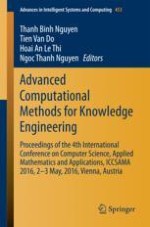2016 | OriginalPaper | Buchkapitel
The Formal Models for the Socratic Method
verfasst von : Nico Huse, Nguyen-Thinh Le
Erschienen in: Advanced Computational Methods for Knowledge Engineering
Aktivieren Sie unsere intelligente Suche, um passende Fachinhalte oder Patente zu finden.
Wählen Sie Textabschnitte aus um mit Künstlicher Intelligenz passenden Patente zu finden. powered by
Markieren Sie Textabschnitte, um KI-gestützt weitere passende Inhalte zu finden. powered by
